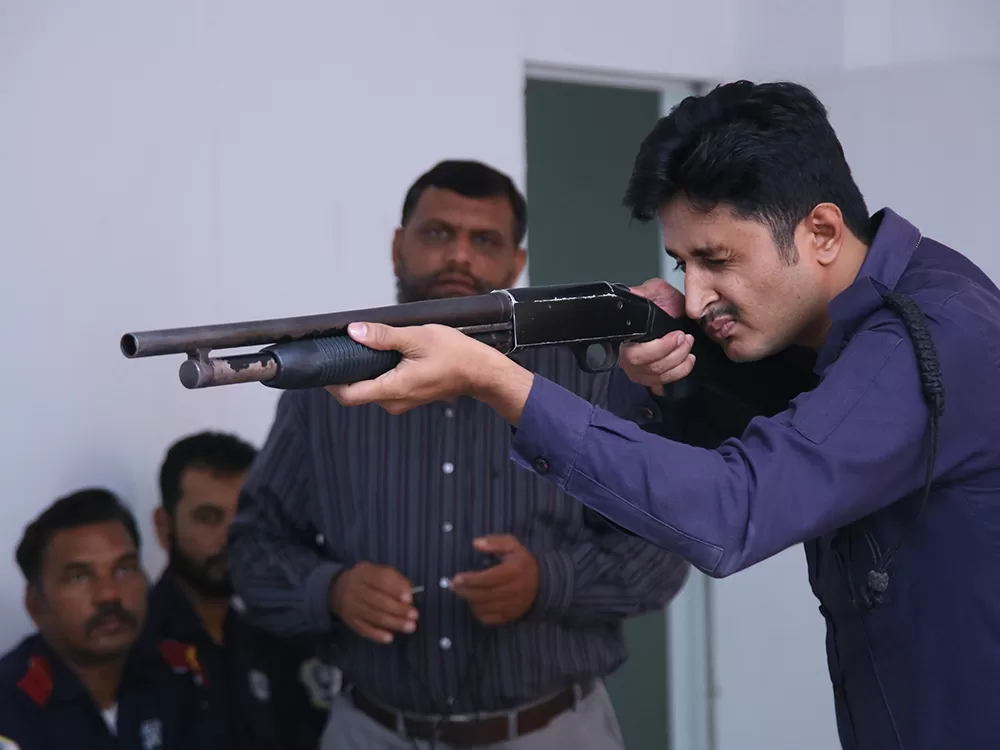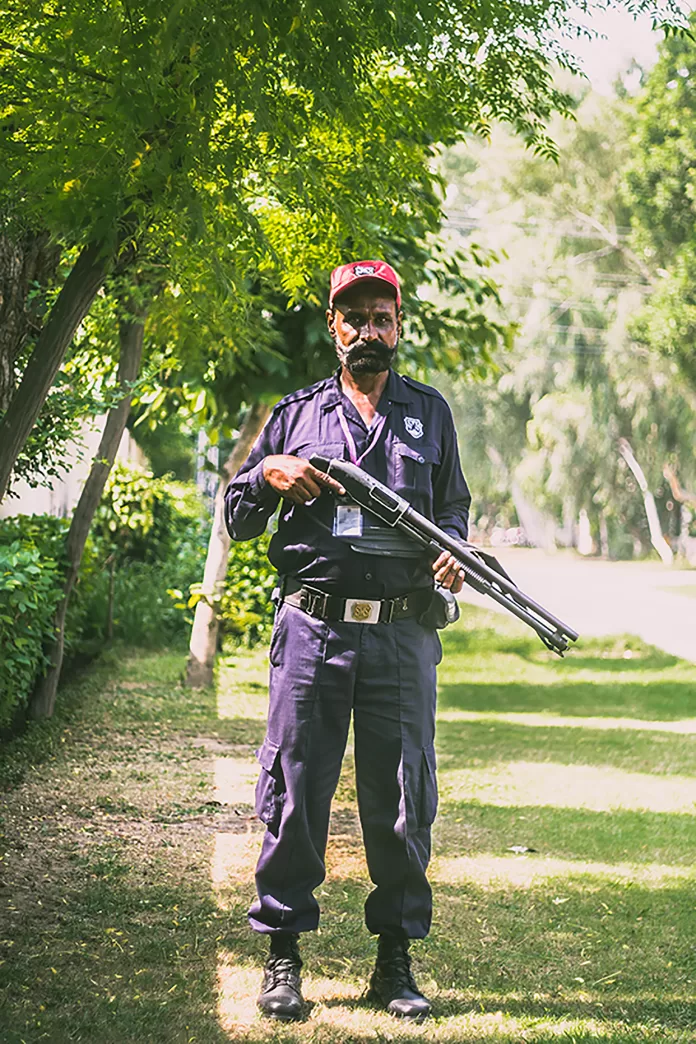Macro-security being the business of the state, micro-security is the domain of individuals or organisations. With a citizen requiring the safety and security of his life and that of his family, property and business, and the state increasingly engaged in macro-security because of terrorism, private security business has become an industry in its own right.
Most clients do not give much importance to training of the guard force. The mindset that it is not essential persists among corporate and security executives, despite the terrorism targeting Pakistan. Generally there is a pervasive complacency about the need for training. Training is a basic requirement, irrespective of every field, far more so in the private security industry. Part of the problem is that a majority of clients feel secure when they hire ex-servicemen as security guards for their protection, their perception being that since they are trained and disciplined they are adequate for physical security.
The fact of discipline aside, many factors overlap in the training of both service personnel and private security guards, who have to contend with entirely different objectives covering disparate responsibilities. Servicemen are not trained to handle the security hazards on a recurring, daily basis that private citizens or organisations face.
Clients generally assume that once a security guard is put into place, one has fulfilled all the requirements of his assigned task and responsibilities. Some minimum aspects of security and safety must be known to security personnel. They should be: (1) well aware of the area of responsibility and a security guard must orient himself to what is required to be protected; (2) before taking over the charge of any place or post, he should be clear regarding his assigned responsibilities, which include his own appearance and procedures of handing over/taking over the duty; (3) must have knowledge about all security systems like personnel-access control, vehicle-access control; (4) he must make sure that electronic surveillance/alarm systems have been installed, and he must be capable of operating these systems in a professional manner; (5) should be well aware that he is an ordinary citizen and not a policeman, and that he is thereby obliged to remain within the bounds of law; (6) should be capable of using all the means (line phone, wireless and even hand signals) of communication during any emergency situation; (7) he must take proactive measures to stop any hazards and breach of security, including the use of patrolling and surveillance techniques to cover both the inner and outer parameters for protection of the maximum area of responsibility; (8) should know basic first aid, which is the utmost requirement at the initial stage of any life-endangering problem; and (9) should know the types of fire hazards before he uses fire extinguishers, because otherwise the results will be severely damaging.

Basic training has to include (1) whether any emergency is man-made or natural (civil disturbance, bomb threats or fire), plans must be ready to overcome the situations and evacuation plans be implemented as a last resort; (2) how batons and handcuffs are to used when the need arises to control the situation; (3) knowledge of terrorist’s use of latest technology and plenty of resources to damage lives and property; (4) access control by installing better equipment and using the proper procedures for personnel and vehicles as well as use of metal detectors, under-carriage search mirrors, walk-through gates and implementing the visitors card system; (5) awareness regarding the use of force must be known, and guards should be made aware of the country’s laws regarding self-defence; (6) post orders are prepared with the consultation of the customers for better performance and giving clear instructions to the designated persons at a specific post; (7) proper training is required to operate the 12-bore shotgun and the .30 pistol since these are the weapons authorised for the use of private citizens in the country: most personnel, whether they are ex-servicemen or civilians, have generally not handled these weapons; (8) actual firing at the firing ranges must be carried out.
Training according to international standards can be divided into two parts: (1) basic training of 80 hours in the classroom, and (2) weapons training of 40 hours in the field. The selected training syllabus must be able to cope with fast changing laws, the prevailing security environment and what is required for protection of lives and property. The basic training syllabus must include: orientation, the client’s assets, local law and the power of arrest, knowledge about terrorism and criminality, fires and explosions, mission emergency plans, physical security measures to be employed for the task, basic guard duties, basic first aid and CPR, guard force communications, general orders and post orders, maintenance of post logs and preparation of incident reports, unarmed defence and restraint of disorderly persons, the use of personal equipment, access control equipment use and procedures, observation techniques, dealing with government employees and the general public, patrolling, etc. Extended imparting of knowledge about terrorism must include extended sessions on improvised explosive devices (IEDs).
For weapons training, whether pistol .30 or the 12-bore shotgun, the syllabus must include nomenclature, sight alignment, functioning, maintenance, safe handling, cover and concealment, ammunition inspection and use, multiple assailant drills, dismantling and assembling of weapon, firing positions (standing, sitting, kneeling and lying), marksmanship techniques, firearms safety precautions, classification firing exercise, cleaning and maintenance of weapons. With a minimum of 10 hours allocated for live firing on the ranges, during field training period live exercises must be carried out with dummy IEDs.

With their educational certificates and computerised national ID cards verified from the National Database and Registration Authority (Nadra), persons under training must also be medically examined, being kept under close observation to check their activities and mental state. Education standards of civilians are normally better than ex-servicemen, they are better aware of the prevailing law and order situation. If properly trained they can be as good, if not better, than ex-servicemen. Those with better education, an individual can handle modern security implements better than ex-servicemen.
The All-Pakistan Security Agencies Association (APSAA) gives due importance to training, with established APSAA training schools in Karachi and Lahore. Members are required to ensure training to their guards prior to assuming the responsibility of any client. A school in Islamabad has been closed down temporarily but is going to be reactivated soon. A couple of APSAA-member companies have their own training facilities. However, more training schools are necessary. The APSAA must have one in each province other than in Islamabad. It is the responsibility of the security company to ensure every guard put on duty has the necessary training to fulfil his duties.
The bottom line is that while an individual must make his own judgment as to whether the private security company providing the service has given the guards adequate training. For any organisation it is the direct responsibility of the professional security manager to ensure that every guard appointed for duty has the necessary training to do his job. Failure to do so amounts to criminal negligence and if an incident happens he must be held accountable.
(A member of the World Economic Forum Global Agenda Council on Terrorism, the writer acknowledges with gratitude help from Maj Allahyar, commandant of a Private Security Guard Training School).
Courtesy: The News




